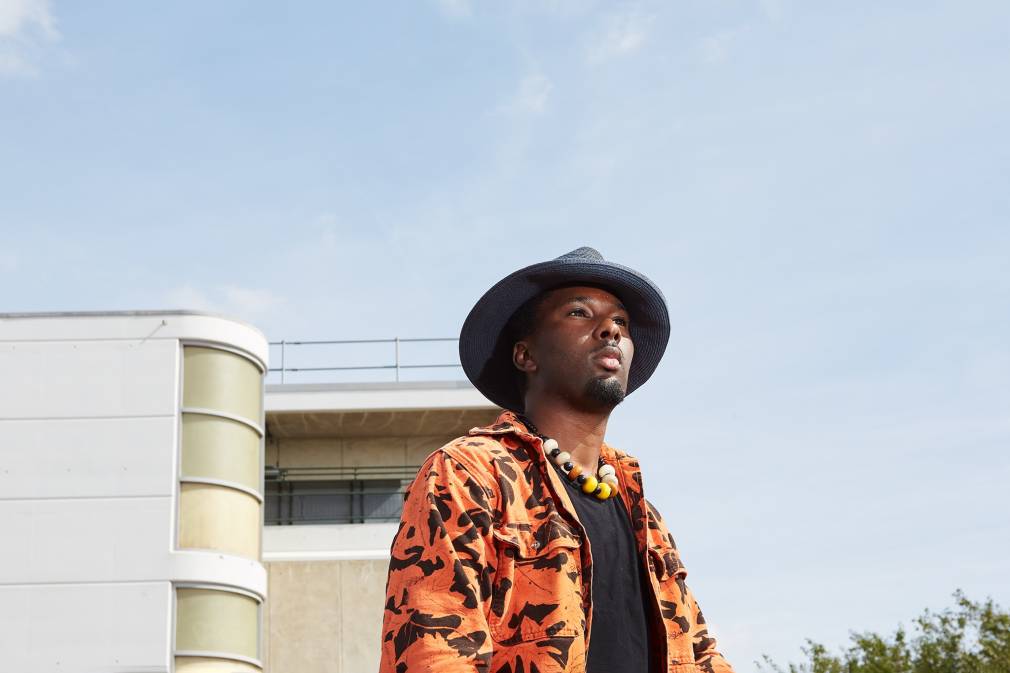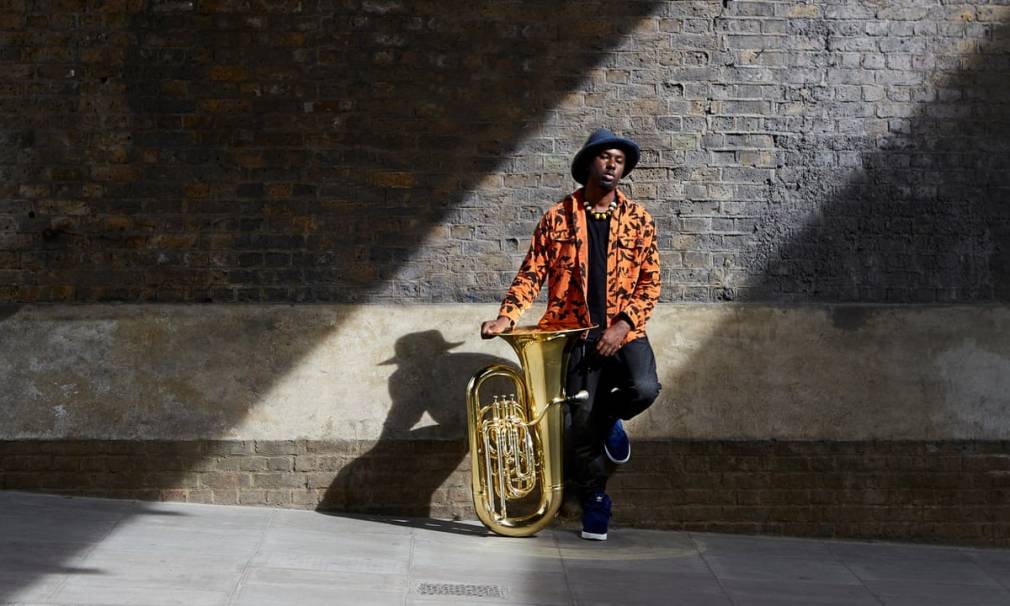In London, Theon Cross is a part of a new wave of jazz musicians that approach the genre with a sense of freedom, experimentation and cross pollination. Among them, he is one of the few to have chosen the tuba, an underappreciated instrument to which the artist has brought a melodic finesse. From Tomorrow Warrior to Sainte-Lucie, Theon cross breaks down his journey.
When it comes to jazz London is burning. A fearless young generation is mixing their love of jazz with grime, dub, afrobeat, electronic music, dancehall, zouk among other genres. While the glory of a jazz ensemble is often handed to the trumpeter or saxophonist, a few tuba players in the genre have made a name for themselves as bandleaders. However, Theon Cross saw the lack of melodic lines in tuba players as an advantage rather than a weakness. He made it a mission to play his instrument like no other and push the boundaries of what’s already been done. This ambition earned him many accolades, from a jazz FM nomination to a spot in Gilles Peterson’s London-focused compilation We Out Here. Whether he’s playing as Theon Cross, jamming in Shabaka Hutchings’ band Sons Of Kemet or laying it down for legendary artists like Jon Batiste or Pharoahe Monch, the british musician always brings a new energy and strength to the table. PAM sat down with Theon for a deep chat about his journey.
Why the tuba?
My parents secretly signed me and my brother up for brass lessons. I was about eight years old. My brass teacher told me and my parents about the various instruments. He lined them up and said whichever one you get a sound out from is the one you will stick with. I was really tiny at that time so I only could blow a tenor horn, a smaller version of the tuba. I joined a marching band when I was about twelve, where I met a lot of young black musicians like Sheila Maurice Grey from Kokoroko… There was no rhythm section and the bass could only be played by the tuba. Since there was no room for me, I transitioned to playing the tuba to fill the only spot there was left. I immediately loved how powerful it sounded. I felt like if you took it out of the music it made it less grounded. From there, one of my mentors helped me discover different types of music like New Orleans jazz, brass bands and things like that. That’s when my passion for it grew.
It feels like it’s not a popular instrument.
Outside of brass band music you don’t see it much. There have been a few people like Bob Stewart, Howard Johnson, or Oren Marshall. It’s not often you see people lead a band with a tuba. I kind of saw a hole for myself. I tried to fill this void. It’s an instrument that needs space to breathe, particularly if you do the bass part. If you’re playing melodies, it can be tricky if not amplified in the right way. It needs a special type of setup that works around it for it to stand out and shine. People think it has limitations, that’s why they don’t pursue it as much as other instruments. Most of the tuba players play the easy parts and play as if it is a background instrument. It can play so many different sounds. If people knew that, they would play it more and differently. It is my mission to make it known that it is an amazing instrument.
How did you manage to find this kind of freedom with this instrument ?
Listening to musicians I respect and like who were pushing the boundaries of it like Bob Stewart, made the tuba sound better than a bass or a trumpet. It appealed to me. I felt it had very few limitations. It inspired me to expand the possible sounds of the instrument. The tuba is a bass and a rhythm section instrument in its essence but it’s also a horn just like a trombone or a saxophone. It’s in this nice middle ground. You can learn how to play both. While growing up I would go to jam sessions and take over the bass but I would also transcribe solos like Sonny Rollins’ ones. I learned both sides.
When did you get into jazz?
I got into it though my brother. He used to listen to Charlie Parker, Miles Davis and others. He used to bring me with him to sessions. I love the freedom of this genre. You need to learn a lot of technique to find your voice and you need to take from the elders to find your own sound. I went on my own to lots of free workshops and programs where they teach you about jazz and improvisation. The associations behind those made a conscious decision to try to reach out to minorities and particularly women. Without places and organisations like those, these people may not have had the same opportunities. When people feel represented in something, it makes them feel like it is possible, it is reachable for them. My journey was defined by seeing myself represented in the jazz world. Having a space where people can see themselves as a part of the music and not like the elephant in the room or the rare case, that’s what helps people be more passionate. Those programs made it their mission to incorporate more people like me in the music industry. They’re responsible for Moses Boyd, Kokoroko, among others.
How did you find your sound?
I speak for myself but also for a lot of the people of my community in London. We are children of migrants which means that we have the sound of London, the place where we grew up but also the sound of the music our parents used to play when we were younger. For me that was reggae, country, soca, zouk music. I also have been influenced by the music of my generation like hip hop, dancehall, grime… My sound comes from the fusion of all these sounds. It comes from embracing the heritage of my parents, the music that was all around me and the styles that I learned attending workshops.
Was it ever complicated for you to live in the western culture considering your origins?
For most of us we live in a place of limbo, of not being strongly one or the other. When you go back “home” you feel you’re not from that culture because you didn’t grow up there but your blackness isn’t seen as part of the british identity. But this has been a benefit. It’s been our journey, for my generation to figure it out. Even on the global scale, not even just in jazz, but also in hip hop, it’s down to us having a very unique perspective of being European but very much from the African diaspora.
I read that in The Offerings you used sounds you recorded when you went to visit your grandma in Saint Lucia. Can you tell me about that process?
When I was there I recorded loads of various sounds I heard: from the market, the streets, conversations with my grandparents… I was there to reconnect and take a break from touring. I collected what I could because I think all of those sounds are music of themselves that I can’t find in London. I felt like I could incorporate it in my music. I wanted to bring back bits that reflect the experience from there. Being able to have that sound in my music was a way to own back and show a piece of my identity. That’s why it was so important.

You love Sun Ra and Fela Kuti. It feels like you are drawn to spiritual music and that yours is spiritual too.
My music deals with self, most of the messages in it are about my own learning, journey, experiences… And that goes into the category of spiritual. I incorporate life lessons I learned from my family in my songs. Like dealing with my lack of confidence and the hardship of letting go of hate and anger. Expressing what you learned and what has been passed to you, to me that is what spirituality is. I am drawn to honesty. As long as one is being true to their intentions and to themselves, whatever state they are in, whether it’s on the high or on the low, it is spiritual to me.
One of your songs is called LDN’s Burning, the one the Clash wrote was politically charged. Since yours doesn’t have clear lyrics, it’s hard to be sure it is also political. Would you say so?
It is a reaction to what I see around me, about how London is changing. It’s titled LDN, not London, which is an expression from East London by Dizzee Rascal, it signifies London from the perspective of people like him and me, people from our particular background. When I say “LDN’s burning” I say the people from my community are being pushed out of the city. I am not seeing the London I grew up with and my version of London anymore. During or maybe after I recorded it the Grenfell Tower fire happened. People who looked like me were left to burn inside of a tower due to the government not caring about their welfare, not caring about them.
What do you want to tackle next with your future music?
Isolation will be one of the main themes. This weird period has made us all go deep within ourselves and feel very powerless and unsure of ourselves. I want to make my music about meditation and learning more about myself, my freedom and my limits. It will be less about my surroundings and more about my feelings. My dad transitioned two months ago and he was always proud of my music and of me. Everything I will do going forward is to honor him as well as my ancestors.



